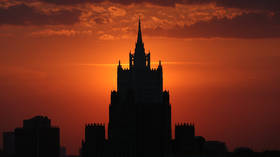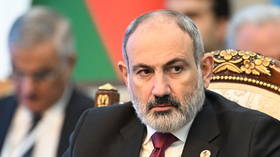Russia questions behavior of defense treaty ally

A decision by Armenia to hold joint exercises with US troops “looks strange,” Russian Foreign Minister Sergey Lavrov told journalists on Sunday. Yerevan is a member of the Collective Security Treaty Organization (CSTO) – a six-member defense alliance that includes Russia and Belarus. However, Armenia has been avoiding any drills with its allies of late, the minister added.
Moscow “regrets” the actions of the Armenian government, Lavrov said at a news briefing on the sidelines of the G20 meeting in New Delhi. An “aggressive NATO nation’s attempts to set a foothold in the South Caucasus” would hardly benefit the region’s security, the foreign minister said.
“I do not believe it will be any good for anyone, including Armenia itself,” he told the briefing. “Wherever the Americans arrive, it always means trouble,” the minister said, adding that, although US troops do sometimes just “sit quietly” on their military bases abroad, Washington “very often seeks to dominate all the developments” – including political ones – in the regions where its forces are present.
Yerevan’s political direction has been sparking concerns in Moscow for quite some time. In September 2022, Armenia refused to take part in a CSTO exercise in Kazakhstan, citing its border conflict with Azerbaijan. Tensions between the two neighbors had flared up at that time, with both accusing the other of instigating border clashes that claimed the lives of dozens of soldiers on both sides.
Armenian Prime Minister Nikol Pashinyan requested military assistance from the CSTO, but the latter refused to send in troops, insisting on resolving the situation via diplomacy. Moscow had helped broker the ceasefire between Armenia and Azerbaijan in 2020, sending peacekeepers to the disputed territory of Nagorno-Karabakh.
In January 2023, Pashinyan insisted that holding CSTO exercises on Armenian territory would be inappropriate. “Therefore, at least this year, such exercises will not be held,” he added without providing further details. His words came after Russia’s Defense Ministry had already announced several joint exercises, including at least one scheduled to be held in Armenia.
Yerevan has also since insinuated that the bloc “failed” to defend Yerevan from Baku and made overtures to NATO instead. Pashinyan also told CNN earlier this year that his nation was “not an ally” of Russia in Moscow’s conflict with Kiev.
The joint US-Armenian exercises are scheduled for next week.
On Friday, Moscow also summoned Armenia’s ambassador over what it called a series of “unfriendly” actions. These included Armenia ratifying the Rome Statute of the International Criminal Court (ICC), Pashinyan’s wife travelling to Kiev to deliver humanitarian aid to Ukraine, as well as “offensive” statements by Armenian parliament speaker Alen Simonyan aimed at the Russian Foreign Ministry.
The ICC, a largely Western-dominated international court, charged Russian President Vladimir Putin with alleged “forcible deportation” of Ukrainian children. Moscow has dismissed the charge as absurd, adding that the court had no jurisdiction over Russia.














